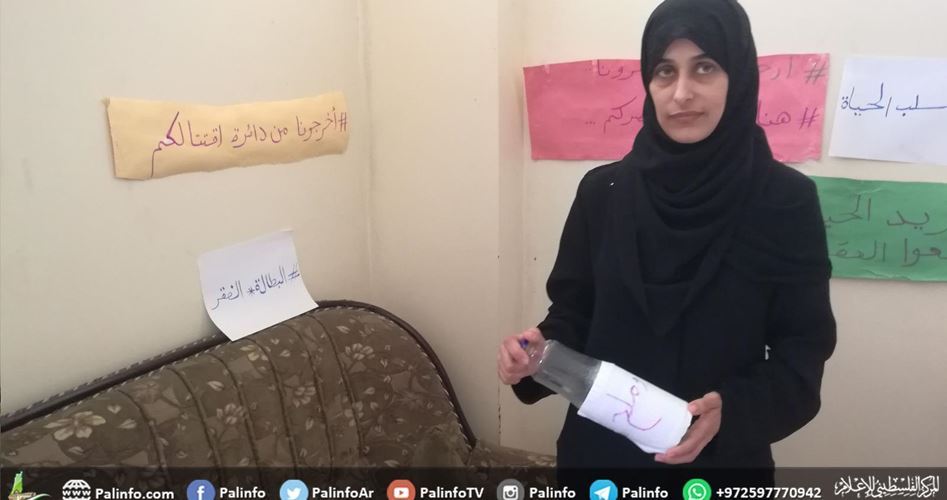Gazan Woman on hunger strike to highlight the rights of Gaza


In her own way, she chose to face the collective punishment imposed by the Palestinian Authority on Gaza, and to let the world know of the disastrous consequences of this destructive policy.
Since September 4, the 32-year-old Shireen Albatrikhi has started the battle of empty stomachs to protest the difficult economic conditions in the Gaza Strip, the Israeli blockade of Gaza, the sanctions of Palestinian Authority President Mahmoud Abbas and the political division.
Over the course of 18 days, Albatrihki has been able to live on water and salt, expressing her rejection of the worsening humanitarian and economic situation in the Gaza Strip.
Message of the strike
Albatrikhi told the PIC that her hunger strike is a message for all officials to look at the suffering of youth and graduates in Gaza.
Albatrikhi blamed everyone who conspired against the Gaza Strip for being fully responsible for her life and the lives of the people of Gaza, demanding that crises of Gaza be solved, and that suffering ends without delay.
She called on Abbas to lift the sanctions on the Gaza Strip, and not punish its people to achieve political gains, adding: “There is no need for these sanctions because of political differences with the other party.”
She called on Hamas and Fatah officials to cooperate and work to end the division.
Hunger strike is a tool of pressure which has been used by Palestinian prisoners in Israeli jails several times to extract their rights, while freed prisoners recently staged hunger strikes to demand the PA to pay their salaries after they were cut off for discriminatory political reasons.
“I know that what I do might be seen by some as illogical and insane. I do not bet on the officials, but on the people to solve the crisis of Gaza,” she added.
She noted, “I went on hunger strike to break the siege on Gaza and lift the sanctions imposed on the people of Gaza.”
A letter without reply
She explained that she sent a written letter to the Minister of Women’s Affairs to address other PA officials and asked for a response which has not arrived yet, noting that the Minister represents Palestinian women.
This is not the first time that Albatrikhi has been on a hunger strike. She has already fought for her right to have a job to support her family, and her story has been widely supported.
Two years ago, Albatrikhi protested against the lack of job opportunities after graduating from the Islamic University of Gaza, Department of Education, 11 years ago.
The Minister of Women’s Affairs, Haifa Al-Agha, gave Albatrikhi an opportunity to work for six months in accordance with the temporary employment system, which gives her a permanent employment later, but according to her, she is still waiting for her permanent job.
Gaza: Increasing poverty
The Gaza Strip suffers from a complete collapse of various economic sectors, as a result of the Israeli blockade imposed on it for 12 years now.
In a study published by the economic expert and director of public relations in the Chamber of Commerce in Gaza, Maher Tayseer Tabbaa, the researcher stressed that the Gaza Strip has plunged into the swamps of unemployment and poverty, and that unemployment is a time bomb that is threatening stability in Palestine.
“The situation in the Gaza Strip has become much worse than it was in 2011. Poverty rates in the Gaza Strip increased by about 37% (from 38.8% in 2011 to 53.0% in 2017).
He pointed to the high rates of extreme poverty among individuals in the Gaza Strip, which reached 33.8% in 2017, while in 2011 it was about 21.1% and therefore there is a rise of about 60% in extreme poverty rates of people in the Gaza Strip.
He called for implementing emergency relief programs for workers, and the development of plans for the rehabilitation of employees, especially that all workers in all economic sectors have lost the skills acquired and experience due to the cessation of work.
He called for the opening of Arab labor markets for Palestinian workers within a specific framework so that workers can be absorbed within a fixed period of time.
The PA has imposed collective punishment on the Gaza Strip since April 2017, which has escalated dramatically in recent months, including large cuts of 50-70 percent of salaries, sending thousands of people into retirement, the blocking of medicines and medical transfers, the cessation of operational budgets of ministries and other sanctions.
The imposition of these sanctions came at a time Washington seeks to pass the Trump plan, known as the Deal of the Century, which was not officially announced, but leaks indicate a US attempt to liquidate the Palestinian issue at the expense of Palestinian rights in collusion with regional countries, amid estimates that the sanctions imposed by the PA lay the foundations and conditions for the execution of the plan.







